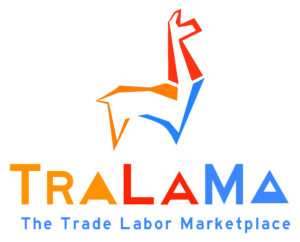By Reginald Tucker
 Most retailers who have ever needed an installer or installation crew to complete a project can attest to a common challenge—difficulty locating a laborer with a specific set of skills. TraLaMa—a novel online platform designed to connect businesses that need labor with installers/mechanics—aims to alleviate that problem.
Most retailers who have ever needed an installer or installation crew to complete a project can attest to a common challenge—difficulty locating a laborer with a specific set of skills. TraLaMa—a novel online platform designed to connect businesses that need labor with installers/mechanics—aims to alleviate that problem.
Developed by Jason Goldberg, CEO of Retail Lead Management and America’s Floor Source, TraLaMa (an abbreviation for Trade Labor Marketplace), allows installers—not just floor layers but all construction trades—to use a dedicated website (tralama.com) to connect with dealers who are looking to complete various jobs.
How it works: A dealer or business signs up with TraLaMa and pays a fee to place a job posting in a given area. This post will essentially include the type of job as well as the day and time the installation needs to be completed. Once the job is posted, qualified installers within the dealer’s area will be notified. Next, the installer can reach out to the dealer to talk more about the job.
“We basically connect construction labor with businesses that need trade labor,” Goldberg explained. “Today, there are a gazillion sites that connect labor to homeowners. And then in some other industries, there are some that will connect labor with, say, restaurants. What we do is we connect trade labor to businesses that need trade labor.”
In explaining the principle behind TraLaMa—which functions like an app—Goldberg used Uber as an analogy. “When you take an Uber, it’s five bucks to a hundred bucks, depending on where you’re going,” he said. “But unlike Uber, where the transaction occurs through the platform, TraLaMa is a connection site. All I’m doing is saying, ‘I’m going to connect you, but you’re responsible,’” Goldberg explained. “I have no liability.”
But here’s the best part, according to Goldberg: There is no charge to the installer or mechanic to use the tool; it’s the retailer or business that pays for the listing. Posting fees charged to retailers can range anywhere from $19 to $75. As Goldberg explained, the fee structure is all based on time. “Let’s say you do a 30-day post on Indeed or even LinkedIn, you’re going to pay approximately $300 for that post,” he said. “But if you just want to do a 24-hour post—there’s a nominal fee for that.”
For the laborers, TraLaMa is completely free—which is unlike the labor-to-consumer model where tradesmen have to pay for those leads, according to Goldberg. “And, by the way, not only do they try to get installers on those platforms, it can start to get a bit like HomeAdvisor where they will call me and they’ll call Joe the installer. Those sites are awful. If you look, everyone always bitches about how bad those leads are, and you’re paying for those.”
Goldberg is quick to emphasize the difference between TraLaMa and third-party sites installers use to find work, i.e., HomeAdvisor and Angie’s List. Existing sites and apps, he said, fail to deliver on qualified leads for installers or bona fide mechanics for retailers or contractors. “If I’m looking for an installer and I put it on Career Builder, Indeed or any of those regular platforms, you get minimal to no response because that’s not where they’re at,” he explained. “We realized no platform existed where true labor in the construction trade can go to find work directly for a business.”
Another major aspect of the TraLaMa program/app is it’s not exclusive to flooring. All totaled, there will be roughly 30 categories of laborers represented. “It’s also siding, windows and framers—anything pertaining to the construction trade,” Goldberg explained.
TraLaMa in practice

To illustrate how seamless the system is designed to work, Goldberg provided a hypothetical situation: “Let’s say America’s Floor Source has a 500-square-foot hardwood job starting next Monday, and I want to get an installer to cover it because our own crews are overbooked and I don’t want to try to push it. So, as a retail owner, I agree to pay $20—or whatever the charge is—to post it for 72 hours. I post the job and then that will automatically feed to any trade laborer who’s signed up. So, Joe the Installer can see this, and he can then click a button to say he’s interested in doing that job.”
Another benefit for the installer is he doesn’t have to go on the site each time he’s looking for a potential job. Once he has signed up, he will simply get a notification about a new job in his geographic area. “He can set his range to 10 miles, 25 miles, 500 miles, whatever,” Goldberg said.
Aside from the job-specific post, there’s also a more generic listing that might be of interest to installers searching for more consistent work. For example, a retailer might simply post an employment listing to the effect of: “I’m looking for five installers or one installer who wants to do hardwood for me every single day. If you’re interested, let me know and I’ll interview you.”
But what about verifying an installer’s skill level? Who’s responsible for that? Some existing sites that businesses and consumers utilize to locate or vet potential laborers or contractors strive to put consumers and users at ease by “pre-screening” installers, electricians, plumbers or other professionals, particularly when it comes to licenses or history of complaints. (The Better Business Bureau is one of them.)
In the case of TraLaMa, installers are judged on an accrual rating system. “When a retailer connects with an installer, they may see he has already done 20 jobs through TraLaMa,” Goldberg explained, citing the program’s star-rating system. “They can see how people rated him.”
There is also a feature embedded in the program whereby an installer can rate himself or herself. For instance, installers can classify themselves as “intermediate,” “beginner” or “advanced.”
Spreading the word
In developing regional pools of installers, Goldberg said he is targeting the usual suspects such as popular social media sites as well as installer-focused industry associations. “We can either notify them if they’re a member of any of the Facebook groups, where it’s predominantly installer based, and we can do targeted digital advertising through social and Google,” he said.
Phoenix has the most sign-ups right now, according to Goldberg, but Dallas and Atlanta are also key targets for the sign-up initiative. “Of course, we are going to do our own markets,” he said. “Once we have enough installers signed up in the different markets, then we flip the marketing tool toward the floor covering retailers.”

